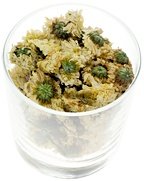Herbs for Wellness
A Guide to Your Chinese
By Laura Stropes, MS, LAc
Chinese herbal formulas have been in use for the past 2,000 years to treat common ailments like cough and flu, digestive problems and sleep issues. Consider replacing some of the over-the-counter Western medications in your home medicine chest with these Eastern herbal formulas.
Acupuncture is probably the most widely known branch of Chinese medicine. But let's not forget that Chinese herbs are an extremely important part of this ancient healing system. More than 300 herbs that are commonly used in modern Chinese herbal formulas have been in use for at least 2,000 years.
Chinese medicine considers the whole body, mind and spirit of the patient, and attempts to treat the root cause, rather than merely treating the symptoms of disease. For most conditions, a trained practitioner of Chinese medicine asks a battery of questions to evaluate a patient's various organ systems, and then feels their pulse and looks at their tongue in order to establish a Chinese medicine diagnosis, such as "spleen qi deficiency," which is a lack of essential digestive energy. The practitioner is then able to select herbs that correct the patient's imbalance, such as strengthening the digestive energy of the spleen. In Chinese medicine, a physical digestive problem (such as spleen qi deficiency) can be caused by excessive or prolonged worrying; therefore, herbs that treat the patient's spirit and calm the mind also might be selected.
 Chinese herbal medicine has safe, reliable formulas that can help prevent and resolve common ailments such as colds and flu, minor digestive complaints, and difficulty sleeping. You can replace some of the over-the-counter Western medications in your home medicine chest with these effective and easy-to-use Eastern herbal formulas.
Chinese herbal medicine has safe, reliable formulas that can help prevent and resolve common ailments such as colds and flu, minor digestive complaints, and difficulty sleeping. You can replace some of the over-the-counter Western medications in your home medicine chest with these effective and easy-to-use Eastern herbal formulas.
Cold and Flu Symptoms
Chinese medicine believes that a person usually catches a cold when their protective energy ("protective qi") is temporarily weak. From a Western medical perspective, we could relate this to the immune defense system being temporarily weakened - by stress, overwork or a poor diet, for example - which allows a virus or bacteria to take hold. Therefore, Chinese medicine encourages adequate rest and nourishing foods, in addition to herbal formulas. Chinese herbal food recommendations for colds and flu include staying away from raw, cold, greasy, heavy and spicy food, because they are hard to digest and divert energy from healing the body. Citrus fruit juices such as orange juice should particularly be avoided if you have a cough, because they increase phlegm production.
Soups and nourishing, warm-cooked foods that the body can quickly transform into vital energy to fight the cold or flu are encouraged. The following remedies are very effective to prevent and treat colds and flu, when taken in appropriate dosages. They should be taken at the higher end of the recommended dosage in the initial stages, and as they take effect, they may be decreased. However, the cold and flu formulas do tend to contain cold-natured herbs, which, like vitamin C, can be a bit hard on digestion. Just like taking too much vitamin C, if you develop loose stools or a stomachache, lower the dosage or discontinue the formula.
Gan Mao Ling: This is probably the most important formula to have in your herbal medicine chest. It is a combination of herbs that helps the body fight infection from cold and flu viruses, and can safely be taken by anyone. If taken preventatively at the first signs of a cold or flu, it may actually keep you from getting sick. It also can be taken all the way through a cold or flu to speed your recovery, and will lessen the severity of your symptoms.
Sleeping Difficulties
Chinese medicine encourages those with difficulty sleeping to calm the mind with meditation, breathing exercises or visualization techniques before going to bed, and to create a quiet and dark bedroom environment that promotes peaceful sleeping. In the evenings, stressful mental work and vigorous exercise should be avoided, and it is recommended to eat dinner early because food can get "stuck" in the digestive tract and cause one to wake up in the middle of the night, or prevent sleep from being deep and restful. Stimulating food and drink, including spicy foods, heavy or greasy foods, heavy meats and rich sauces, and alcohol should be avoided at least three hours before sleep, and ideally, caffeine should only be consumed in the morning. Traditional Chinese herbal sleep formulas are designed to be taken several times a day, including a larger dose before bed, but they do not cause drowsiness. Rather, they work to promote restful sleep by calming the mind and body. For best results, these formulas should be taken regularly for several months.

